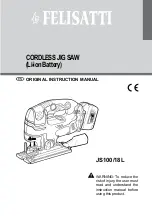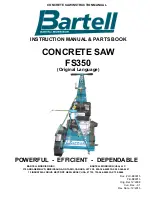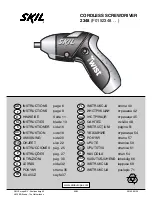
13 ENGLISH
To install, insert the bar part into the square hole of the base
with the fence part facing down. Slide the rip fence to the
desired cutting width position, then tighten the bolt to secure it.
1
2
3
Fig.25
►
1.
Hex wrench
2.
Bolt
3.
Rip fence (Guide rule)
Circular cuts
When cutting circles or arcs of 170 mm (6-11/16") or
less in radius, install the rip fence as follows.
1
Fig.26
►
1.
Rip fence (Guide rule)
CAUTION:
Do not touch the tip of the circular
guide pin.
The sharp tip of the circular guide pin can
cause injury.
1.
Insert the bar part into the square hole of the base
with the fence part facing up.
2.
Insert the circular guide pin through either of the two
holes on the fence part. Screw the threaded knob onto the
circular guide pin to secure the circular guide pin.
4
3
1
2
5
Fig.27
►
1.
Threaded knob
2.
Rip fence (Guide rule)
3.
Circular guide pin
4.
Bolt
5.
Hex wrench
3.
Slide the rip fence to the desired cutting radius,
and tighten the bolt to secure it in place.
NOTE:
Always use jig saw blades No. B-17, B-18,
B-26 or B-27 when cutting circles or arcs.
Anti-splintering device
Optional accessory
CAUTION:
The anti-splintering device cannot
be used when making bevel cuts.
For splinter-free cuts, the anti-splintering device can
be used. To install the anti-splintering device, move the
tool base all the way forward and fit it from the back of
tool base.
When you use the cover plate, install the anti-splintering
device onto the cover plate.
1
2
Fig.28
►
1.
Base
2.
Anti-splintering device
Cover plate
Use the cover plate when cutting decorative veneers,
plastics, etc. It protects sensitive or delicate surfaces
from damage. Fit it on the bottom of the tool base.
1
2
Fig.29
►
1.
Cover plate
2.
Base














































